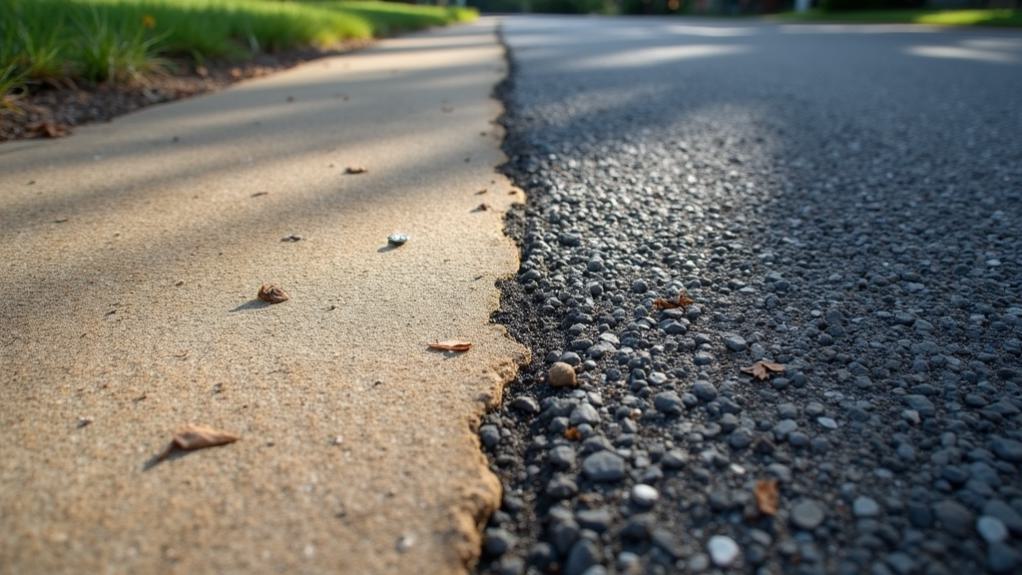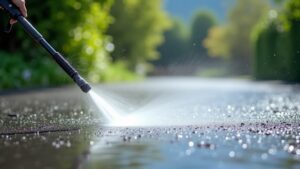Vinegar can damage your asphalt driveway due to its acidic content, which may soften asphalt-based adhesives and lead to long-term deterioration. While many homeowners report no immediate effects, regular or prolonged use raises concerns about moisture retention and crack exacerbation.
Anecdotal evidence shows vinegar may effectively kill weeds without significant damage, but caution is advised since the long-term impact remains largely unexplored.
It’s best to contemplate safer alternatives for cleaning and upkeep. To guarantee your driveway’s longevity, you might find more valuable insights on effective maintenance practices and safe cleaning options.
Key Takeaways
- Vinegar’s acetic acid can soften asphalt-based adhesives, potentially compromising the driveway’s structural integrity over time.
- Prolonged vinegar exposure may cause cumulative deterioration, though long-term effects remain largely unstudied.
- Many homeowners report limited damage when using vinegar, but caution is advised due to possible long-term risks.
- Regular maintenance, such as seal coating and inspections, can help protect asphalt driveways from damage caused by acidic substances.
- Professional recommendations favor using commercial degreasers over vinegar for cleaning asphalt surfaces to avoid potential risks.
Understanding Vinegar’s Acidity
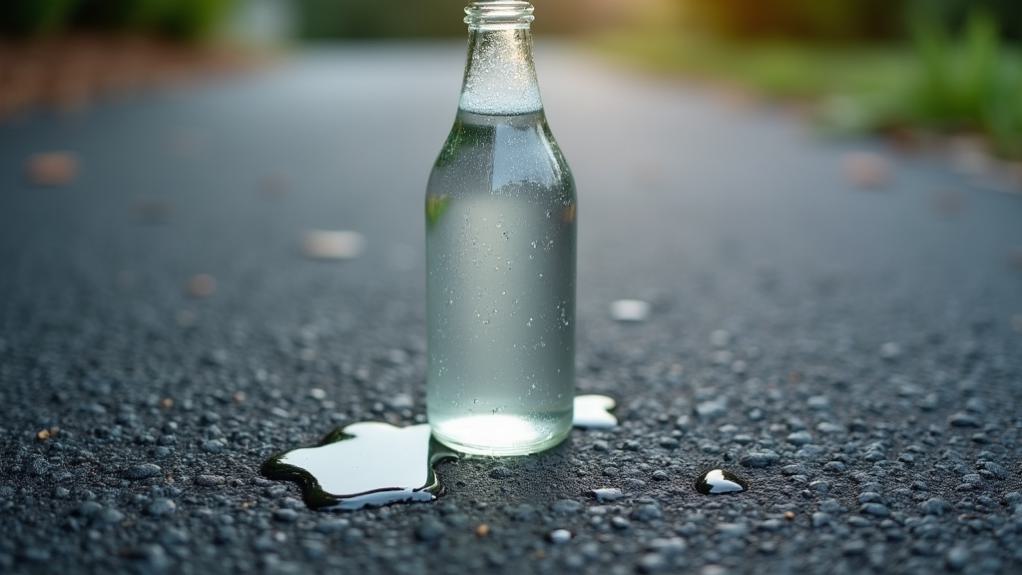
When it comes to understanding vinegar’s acidity, it’s crucial to recognize that vinegar primarily consists of acetic acid, which gives it its characteristic sour taste and strong reactivity. This acidity can impact various materials, including asphalt.
When you apply vinegar to asphalt surfaces, its acetic acid can soften asphalt-based adhesives, potentially affecting their structural integrity.
While you may seek vinegar for stain removal on asphalt, it’s vital to proceed with caution. Anecdotal evidence suggests that vinegar doesn’t cause significant damage to asphalt; however, the effects can vary based on the specific adhesive composition within the asphalt.
The uncertainty surrounding long-term exposure to vinegar’s acidity raises concerns about potential degradation over time.
If you decide to use vinegar for cleaning, consider testing it in a small, inconspicuous area first. This approach allows you to gauge how your specific asphalt reacts before applying it broadly.
Ultimately, while vinegar can be an effective stain removal agent, its acidic nature necessitates careful consideration to avoid unintended consequences on asphalt surfaces. Always prioritize testing and observe any changes closely.
Potential Risks to Asphalt
Vinegar’s acidic properties pose several risks to asphalt surfaces, especially when used frequently or in high concentrations. While you might think it’s a harmless cleaning agent, there are potential risks associated with its use on your asphalt driveway.
| Risk | Description |
|---|---|
| Softening of Adhesives | Vinegar can soften asphalt-based adhesives, leading to the release of VOCs. |
| Increased Moisture Retention | Its hygroscopic nature can trap moisture, accelerating wear and tear. |
| Unstudied Long-term Effects | The long-term effects of vinegar on asphalt remain largely unexamined. |
It’s essential to approach the use of vinegar cautiously. While it can be effective for certain stains, regular application might lead to deterioration over time. Testing vinegar on a small, inconspicuous area before broader use is advisable to assess any adverse reactions. By being aware of these potential risks, you can make more informed decisions about maintaining your asphalt driveway without inadvertently causing harm.
User Experiences With Vinegar
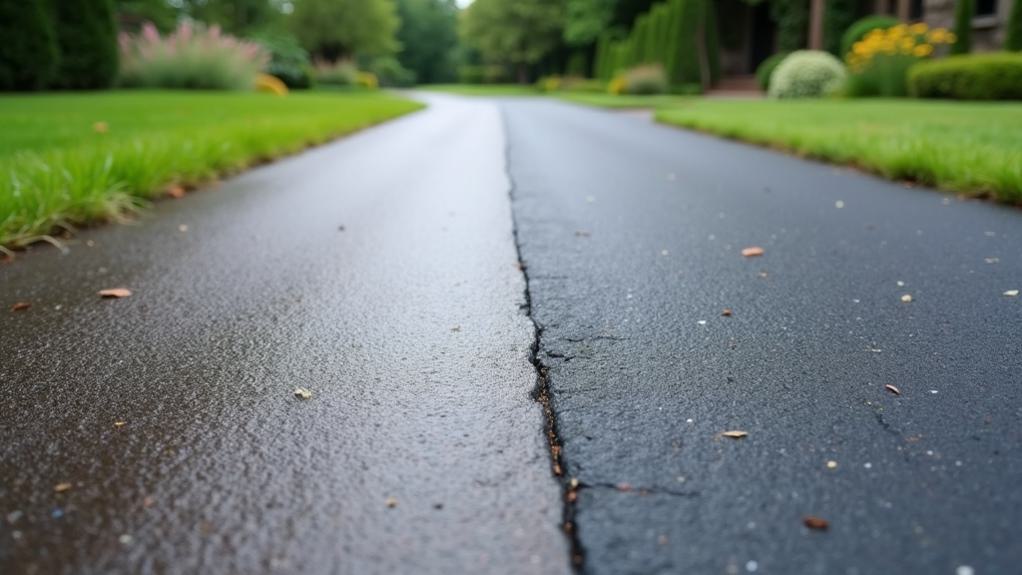
Many homeowners have shared their experiences with using vinegar on asphalt driveways, highlighting a range of outcomes that often defy the concerns surrounding its acidic properties.
Many users report successful applications of vinegar without encountering significant damage or adverse effects. Anecdotal evidence suggests that when used properly, vinegar’s high acidity doesn’t lead to noticeable deterioration of asphalt surfaces.
Additionally, regular maintenance practices, such as sealcoating to extend lifespan, can further protect driveways from potential damage.
Community feedback emphasizes vinegar’s effectiveness as a weed killer, pointing out that it manages to eliminate unwanted plants without compromising the integrity of asphalt driveways.
Positive testimonials consistently confirm that vinegar doesn’t leave behind harmful residues that could affect the longevity of your driveway.
In fact, many users encourage others to contemplate vinegar for its versatility and perceived safety on asphalt surfaces.
Long-Term Effects on Asphalt
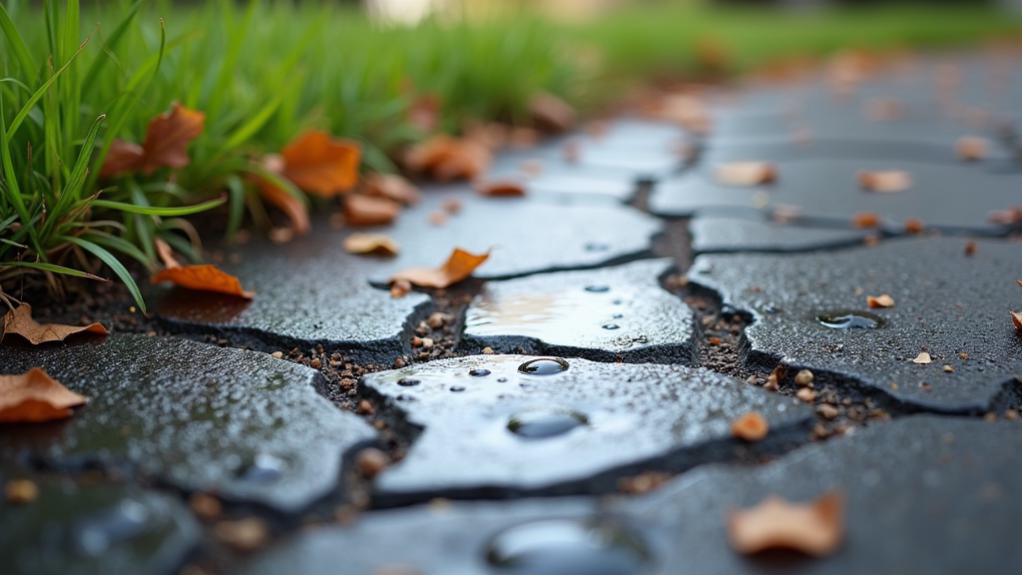
While vinegar may seem like a convenient cleaning solution, its long-term effects on asphalt can be detrimental. Prolonged exposure to vinegar can soften asphalt-based adhesives, which may lead to the release of volatile organic compounds (VOCs) that pose health risks.
The acidity of vinegar can contribute to the deterioration of asphalt surfaces, especially if used frequently, as it worsens existing cracks and facilitates damage over time. Additionally, it’s important to highlight that regular maintenance, such as seal coating offered, can greatly assist in preserving the integrity of your asphalt driveway.
It’s important to understand that while some anecdotal evidence suggests vinegar hasn’t caused considerable damage in isolated cases, the cumulative effects of repeated applications remain largely unstudied.
Continual use of vinegar as a cleaning agent can increase water retention in the asphalt, exacerbating freeze-thaw cycles. This can result in cracking and spalling, ultimately compromising your driveway’s integrity.
To mitigate potential long-term effects from using acidic cleaners like vinegar, regular maintenance and sealing of asphalt surfaces are essential. By prioritizing proper care, you can help prevent considerable damage and extend the lifespan of your driveway.
Always consider the implications of your cleaning choices to maintain the quality and safety of your asphalt surface.
Recommendations for Driveway Care
Proper driveway care is essential for maintaining the longevity and appearance of your asphalt surface. By following a few straightforward recommendations, you can enhance the durability of your driveway or parking lot and prevent costly repairs.
Regular maintenance options, such as seal coating, are vital for protecting your investment and ensuring its longevity, as highlighted in our comprehensive asphalt services.
- Regularly sweep and clean your driveway to remove debris, leaves, and dirt, which can trap moisture and lead to deterioration.
- Inspect your asphalt paving for cracks and damage at least twice a year. Address any issues promptly with appropriate crack fillers to prevent further deterioration.
- Sealcoat your asphalt driveway every two years. This protects it from UV damage, oxidation, and water intrusion, extending its lifespan considerably.
- After using any cleaning agents, including vinegar, rinse the driveway thoroughly. This prevents any potential chemical residue from affecting the asphalt over time.
Additionally, consider eco-friendly alternatives for cleaning and weed control. While vinegar can be effective, it should be used cautiously to avoid harming surrounding plants and surfaces.
Implementing these strategies will help you maintain a resilient and visually appealing asphalt driveway, ensuring it serves you well for years to come.
Common Misconceptions About Vinegar
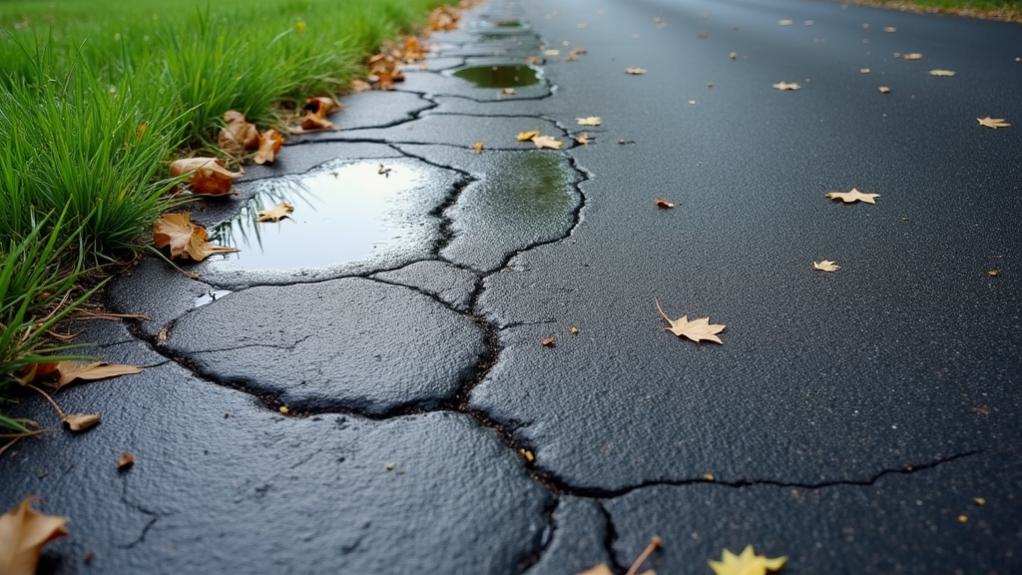
Vinegar is often touted as a safe and effective cleaning solution, but several misconceptions can lead to unintended consequences, especially when used on asphalt. Many believe that vinegar is universally safe for all surfaces, ignoring its acidic nature, which can affect materials like asphalt.
While anecdotal evidence suggests vinegar typically doesn’t damage asphalt, the long-term effects of repeated applications remain largely unstudied.
A common misunderstanding is that vinegar’s eco-friendly reputation guarantees its safety on asphalt. However, vinegar’s chemical properties can soften asphalt-based adhesives, potentially releasing harmful volatile organic compounds (VOCs). This means that while vinegar can effectively clean certain stains, you should use it sparingly on asphalt to avoid adverse effects.
It’s essential to recognize that misconceptions about vinegar being a harmless cleaning agent overlook its potential risks. Misusing vinegar on asphalt can lead to issues that may not be immediately apparent, but could affect the longevity and integrity of your driveway.
As a result, understanding these misconceptions can help you make informed decisions about using vinegar as a cleaning solution on your asphalt surfaces.
Professional Advice on Cleaning
When it comes to cleaning asphalt driveways, professional advice emphasizes the importance of using appropriate products to maintain the surface’s integrity.
Vinegar, while a popular cleaning agent, isn’t recommended due to its acidity, which can soften asphalt-based adhesives over time.
To effectively clean your asphalt driveway, consider the following tips:
- Use commercial degreasers specifically formulated for asphalt.
- Always conduct a patch test on a small, inconspicuous area before full application.
- Follow manufacturer instructions on any cleaning product to guarantee safe use.
Conclusion
In summary, while vinegar’s acidity can effectively clean certain surfaces, it poses risks to asphalt driveways due to potential degradation. Studies show that acetic acid can weaken asphalt’s binding agents, leading to cracks and potholes over time.
To preserve your driveway’s integrity, consider safer alternatives like bleach and water or specialized cleaners.
Regular maintenance is essential—around 60% of homeowners neglect proper care, inadvertently shortening their driveway’s lifespan. Prioritize informed choices to guarantee long-lasting results.
